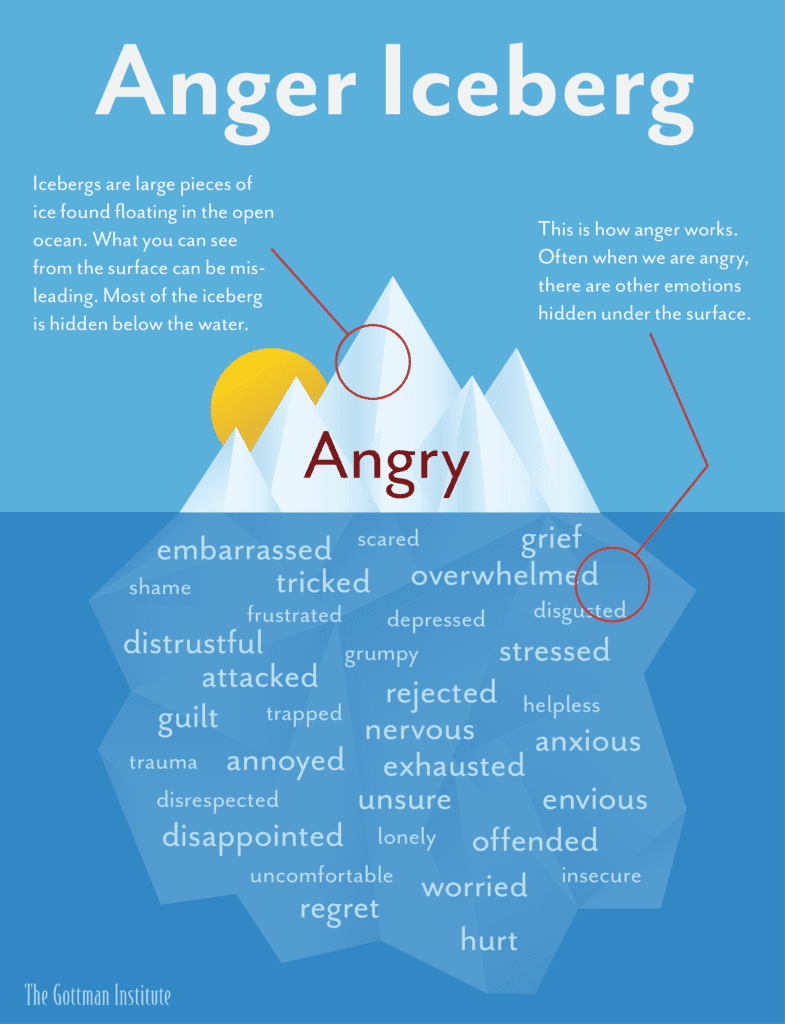Why We Choose Anger as a Response

Typically, when we view anger, we think of the ripple effect anger has on those around us. We view all the people as victims in the path of anger’s destruction. Rarely do we see the person who had an angry outburst as a victim as well. But anger typically goes deeper than an impulsive reaction to something.
Anger is actually a secondary emotion. Meaning it’s a mask for another primary emotion that we are experiencing. Check out this illustration by the Gottman Institute….

So, why not just grasp onto the real emotion and skip the anger thing altogether?
2 Reasons We Choose Anger
- We simply don’t realize something else is going on beneath the mask of anger.
- Anger is a much easier choice. It’s easier to be angry than it is to say I’m feeling isolated, lonely, or rejected. I can avoid the hurt feelings of rejection by masking it with anger. Let me say it another way. I can avoid dealing with hurt feelings if I mask it with anger.
The Payoff of Choosing Anger
Masking primary emotions with anger makes it easier to point to others or the circumstances around us rather than owning our own emotions. Again, the payoff is avoiding our hurt feelings.
Problems with Masking Primary Emotions as Anger
1. Masking our primary emotions with anger gives the enemy a foothold (Ephesians 4:26-27). Foothold literally means to gain a secure position to make further progress. The enemy would love to make progress in building up tension and hardness of heart within your relationships.
2. Masking our primary emotions leads to bitterness and resentment. When we choose to mask our hurts with anger we allow bitterness and resentment to take root. This happens because we never address the deeper issues/emotions. As the deeper emotions are addressed within relationships peace and resolution are the result.
3. Without identifying the primary emotions and moving toward resolution, bitterness leads to unforgiveness and bearing grudges. These are not ingredients for a thriving relationship.
4. The other problem with masking our true emotions is our hearts become hardened. A hardened heart has difficulty understanding or perceiving truth, (Mark 6:52). This causes increased difficulty in moving toward resolution within our relationships.
Solutions: Choosing Primary Emotions Over Anger
- We must become aware that anger is a secondary emotion. Now that you’ve read this article you can’t unknow this. Each time you feel anger rise up in you, ask yourself what’s going on? Take a deeper look. Use your anger as a red flag of another underlying emotion.
- Secondly, we have to identify the primary emotions. This can be difficult if you have set up a pattern of embracing anger. Keep in mind though, nothing is too hard for God. It is helpful to prayerfully journal (sign up for a guide on how to journal here) in order to sort through our thoughts and emotions. This is also a good time to seek wise counsel if you struggle to identify primary emotions. I find it helpful to imagine someone I love in my shoes and then I try to imagine how they might feel.
- Determine if this primary emotion or response is something you need to take responsibility for or if it is something that needs to be addressed within your relationship.
- Finally, intentionally and consistently study God’s Word. God’s truth is the plumbline for guidance in our life and relationships. The Bible discerns the heart according to Hebrews 4:12, turning confusion to clarity. Also, prayerfully approach your anger. God’s best for you does not include anger as it does not produce the righteousness of God in you or your relationships.
My dear brothers and sisters, take note of this: Everyone should be quick to listen, slow to speak and slow to become angry, because human anger does not produce the righteousness that God desires. ~James 1:19-20
Why We Choose Anger Wrap Up
We often choose anger to avoid feelings of vulnerability. This route does give us a quick win, meaning we get out of those vulnerable feelings. However, in the long run, choosing anger leads to a lack of resolution, hardening hearts. This is a harmful pattern that needs to be changed once identified. Start by taking a deeper look inward, identifying the true emotions. Use journaling, bible study and prayer when taking that inward look.
